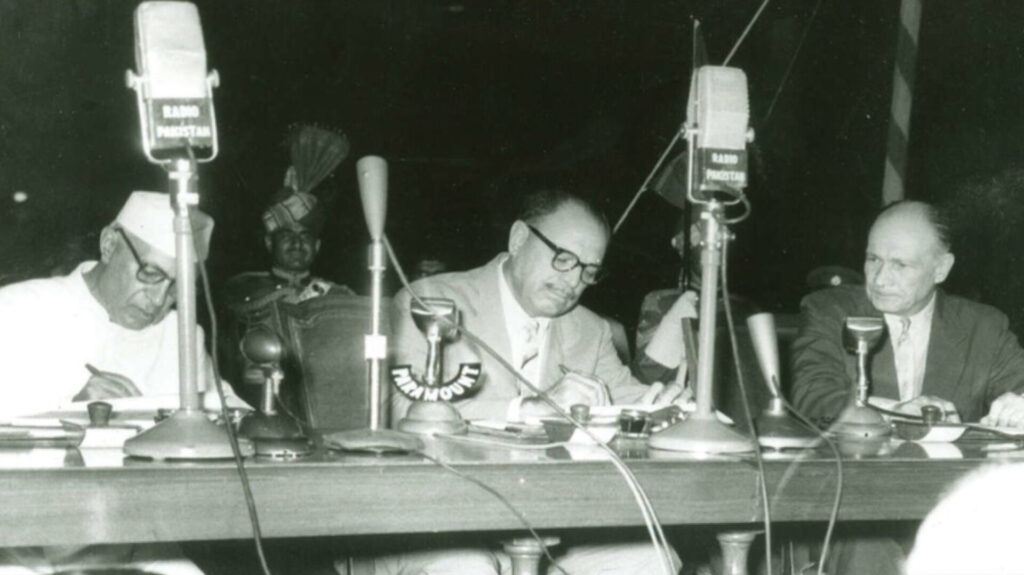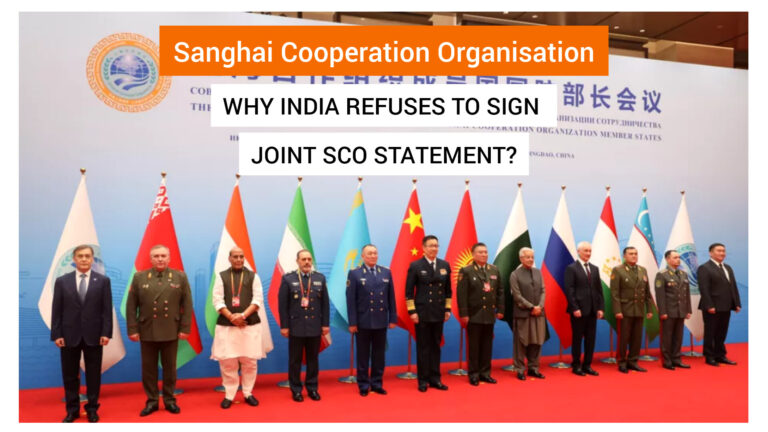On 22 April 2025, in Pahalgam, famous as Mini Switzerland in India, 5-6 terrorists killed tourists on the basis of religion. After which PM Narendra Modi, who went on a tour of Saudi Arabia, leaves his tour midway and returns to India. After his arrival, he met Ajit Doval at the airport and got a comprehensive briefing about the whole situation. After that 5 big decisions are taken in the CCS (Cabinet Committee on Security) meeting at the PM residence in which the biggest decision is believed to be the cancellation of the Indus Water Treaty. But what is this Indus Water Treaty?
INDUS WATER TREATY: Explained

To know about this Indus Water Treaty, we have to go a little into the past when India and Pakistan became independent. With the 1947 partition of the country, tension arose over the distribution of water. All the rivers flowing in Pakistan that are Indus, Jhelum and Chenab originated in India. Pakistan was dependent on this water for irrigation, the fact is that even today Pakistan supplies 80% of its water from these water sources. In 1948, the Inter-Dominion Agreement governed the rules of water sharing under which Pakistan would make annual payments to India in exchange for an adequate amount of water. But this was a temporary arrangement and talks were going on for a permanent arrangement.
Pakistan, worried about drought and other natural disasters, hoped to take the issue to the International Court of Justice. However, India called it a bilateral issue and proposed to sit and resolve it accordingly. Finally, in September 1960, the World Bank succeeded in getting a treaty signed between the two countries, which we today call the Indus Water Treaty. This treaty was signed by India’s Prime Minister Jawaharlal Nehru and Pakistan’s President Ayub Khan and put into effect.

Under this treaty, India has full permission to use the water of Sutlej, Beas and Ravi, while Pakistan has permission to use 80% of the water of Indus, Jhelum and Chenab.
There were some other conditions in this treaty about which we hardly read today.
1. Under this treaty, India had to supply water from Sutlej, Ravi and Beas rivers for the first 10 years until Pakistan built a proper canal system to use the water of its share of rivers Indus, Jhelum and Chenab.
2. To build this canal system, India had to pay £62,060,000 to Pakistan in 10 installments which is Rs. 7,05,11,57,904 (7 billion 5 crore 11 lakh 57 thousand and 905 rupees).
3. A permanent Indus Commission was also established to resolve any kind of issue. An arbitration mechanism was established to resolve disputes amicably.
4. International Bank of Reconstruction and Development, which we know today as World Bank, Australia, New Zealand, Canada, West Germany, United Kingdom, USA and Pakistan entered into an agreement which was named Indus Basin Fund Agreement.
Under this agreement, Australia provided 1,16,32,666 AU$, New Zealand provided 15,03,434 NZ£, Canada provided 3,89,10,794 Can$, West Germany provided 9,30,00,000 Deutsche Mark, United Kingdom provided 3,48,38,571 GB£ and America provided 29,55,90,000 US$ as funds and loans to Pakistan.
The Indus Water Treaty is considered to be the world’s most successful water sharing treaty, but this treaty was being violated for a long time.
A part of the Indus river also flows through the Delta Channel in the Runn of Kutch in Gujarat, India, before joining the sea. Pakistan constructed the Left Bank Outfall Drain (LBOD) project in the great Runn of Kutch in 1987-1997 with the help of the World Bank without India’s consent. The purpose of the LBOD is to stop the saline and polluted water in the Indus Delta of Pakistan and divert this water towards the sea. The water released by Pakistan in the LBOD causes floods in India and the polluted water coming through it pollutes the water bodies in Kutch which is used for salt farming.
REPEAL DEMANDS AND CONFLICTS
According to the Indus Water Treaty, only India has the right to use the water of Sutlej and Ravi. The downstream of both these rivers passes through India and goes to Pakistan. Pakistan shall not use both these rivers for any purpose. Near the Ferozepur border of India, the Sutlej river travels a little through Pakistan and then returns to India. But Pakistan uses this river to dump their waste from factories near Kasur town of Pakistan on the Indo- Pak border.
When our team got a chance to visit one of the village Kaluwala near firozpur border of India, people told us that across the border in Pakistan there are leather factories whose waste is dumped in the Sutlej river, due to which when that river returns to India, its water becomes completely dirty and gives out a very dirty smell.
The nearby villages use this river for irrigation, many times their crops also get spoiled because of the dirty water and many times the tube wells installed in their houses also pick up this water due to which they have a fear of terrible diseases.
There is a repeated demand to repeal this treaty in the Jammu and Kashmir state of India, like in 2003, the Jammu and Kashmir Vidhan Sabha unanimously passed a proposal to repeal this treaty.
Then in 2016, J&K Vidhan Sabha demanded an amendment in the Indus Water Treaty due to increase in irrigated land and hydropower development in Jammu and Kashmir is not satisfactory due to the restrictions imposed by this Treaty.
The legislators of J&K feel that the treaty tramples on the rights of their people and treats the state of Jammu and Kashmir as a non-entity.
Following the 18 September 2016 terrorist attack by Jaish-e-Mohammed on an Indian Army brigade headquarters at Uri, India threatened to cancel the Indus Water Treaty.
The Prime Minister Narendra Modi declared, “blood and water cannot flow together.” India subsequently decided to restart the Tulbul Project on the Jhelum River in the Kashmir Valley (which had been suspended since 1984 in response to Pakistani objections).
Since 2016, A PIL demanding that the treaty be declared unconstitutional has been pending in the Supreme Court of India. India officially informed Pakistan about the need to renegotiate the treaty in 2023. India alleged that Pakistan has repeatedly engaged in actions that are against the spirit and purpose of the treaty. Pakistan has responded to this notice by saying that Pakistan cannot afford to abrogate the Indus Water Treaty. India did not appoint a jury of two judges to constitute a joint committee of the Court of Arbitration and neutral experts in consonance with the Indus Water Treaty and international law.
In late June 2023, the court will consider the appeal and decide the competence of the court as a preliminary matter. The COA gave its partial verdict on 6 July 2023, stating that the formation of the COA on Pakistan’s substituted request is valid under the provisions of the IWT and the COA will take up only those disputes that are not within the jurisdiction of the neutral expert so as to avoid simultaneous proceedings on the same matters by both the COA and the neutral expert.
In January 2025 this year, the NE gave a preliminary verdict, stating that the NE is fully competent to settle the differences raised by India as per the terms of the treaty. In January this year itself, the State of Jammu and Kashmir initiated planning activities of Kishanganga II (40 MW) Project.India formally sought a review of the treaty in September 2024. Pakistan at the same time reaffirmed the importance of the agreement and requested that India continue to abide by the treaty’s provisions.
India officially stopped the flow of Ravi river water to Pakistan on 1 March 2025 after a delay of 45 years, marking a significant change in the water dynamics of the region.
Pahalgam’s Horror that acted as Last nail in Coffin for Pakistan
Let us tell you that on 22 April 2025, 26 people were killed in a terrorist attack in Pahalgam’s Baisaran Valley. Officials have said that 2 UAE and Nepali as well as 1 local person are also included in the dead. The other tourists killed were from many states including Karnataka, Maharashtra, Haryana, Gujarat, Tamil Nadu, Maharashtra and Uttar Pradesh.
The Times of India has quoted sources in a report that the terrorists asked for identity cards from the victims. Then asked them to recite ‘Kalma’ and then removed their pants and checked for circumcision. 25 non-Muslims were targeted in this attack. The terrorists brutally checked their non-Muslims and then shot them dead by shooting someone in the head and someone in the chest from close range.
In this attack a local of Pahalgam who was identified as Syed Adil Hussain Shah who used to serve ponies to the tourists there was also killed. Let me tell you, he is the same courageous person who had tried to snatch the rifle from the terrorists. Syed was the only breadwinner of his family. Syed used to take tourists on his horse from the car parking to Baisran Maidan.
His father Syed Haider Shah told ANI: “My son had gone to Pahalgam for work yesterday, and around 3 pm we came to know about the attack. We called him, but his phone was switched off. Later, at 4.40 pm his phone was switched on, but no one answered. We rushed to the police station, and then we came to know that he was shot in the attack. Whoever is responsible will have to face the consequences.”
The day after this attack, a meeting of the Cabinet Committee on Security (CCS) was held at the residence of Prime Minister Narendra Modi. Foreign Secretary Vikram Misri announced 5 major decisions in the press conference held after the meeting.
1. The Indus Water Treaty has been suspended with immediate effect. The government said that it will remain suspended until Pakistan stops supporting terrorism from across the border.
2. Integrated check post Attari has also been closed. People who have crossed the border illegally can return from this checkpost before 1 May 2025.
3. The scheme of SAARC visa exemption for Pakistani citizens has also been stopped. In this meeting, it was also decided that the SPES visa already issued to Pakistanis will also be considered invalid. Pakistani citizens who came to India through this visa have also been ordered to return within 48 hours.
4. The defence, military and air advisors retained by the Pakistani High Commission in New Delhi have also been declared no-go areas. They will have to leave India within a week.
5. India has also ordered the return of its Defence, Navy and Air Advisors who are being held in Islam by the Indian High Commission. These posts will be dismissed from the Indian High Commission in Islamabad.
The demand for repeal of the Indus water treaty is being raised again and again. If we look at it from the perspective of time, then Pakistan was benefiting more from this treaty. Because of this treaty, India is facing huge difficulties in constructing big hydro projects and dams in Jammu and Kashmir. This treaty should be made again for the people of Jammu and Kashmir so that the people of J&K can also benefit from these rivers.
As for the rest, please do tell us what you think about this treaty. Seeing the increasing tension between India and Pakistan, is the decision to cancel this treaty correct?
Feel free to share your opinion in the comment section.






